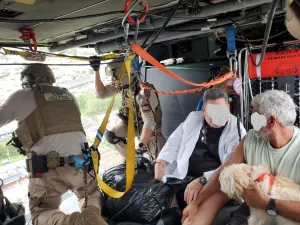AGUADILLA, Puerto Rico- U.S. Custom and Border Protection, Air and Marine Operations (AMO) immediately started Monday to use its new capabilities by hoisting and rescuing two persons near a motel in Cabo Rojo that were stranded by the record-breaking flooding resulting from Hurricane Fiona.
“Due to operational needs, the CAMB’s involvement in hurricane humanitarian response, and an increase maritime rescues events, adding this capability for our agents will lead to more lives saved,” said Director Air and Marine Operations, Augusto Reyes.
Although agents are continuing to see an increase in maritime migration events, such a surge in maritime migrant traffic has led to an increased number of rescue situations.
In early August, the Caribbean Air and Marine Branch (CAMB) conducted its first UH-60 hoist rescue of a migrant trapped on a rocky cliff area in Desecheo Island.
The CAMB currently has two hoist capable UH-60 aircraft which have been made available to federal and state response authorities to respond and recover after Hurricane Fiona.
Since a low point in Fiscal Year (FY) 2017, maritime apprehensions have increased 1,548 percent in the Caribbean; from 35 to 577 FY22 year to date, 1,530 percent in Miami; from 360 to 5,870 and 4,084 percent in San Diego; from 32 to 1,339.
Additionally, with the increased numbers of maritime events, AMO has seen more events where people are ending up in the water. Because of these situations, AMO agents are testing and evaluating several new tools and pieces of equipment to help save lives and better retrieve individuals from the water. AMO Marine agents are currently increasing supplies of throwable flotation devices, cargo nets, and specially designed ladders that will be attached to our marine vessels. They are also refitting and relocating the trauma kits in our vessels to make them more accessible.
Safety of life at sea is always the priority for AMO agents and these changes are a direct result of agents in the field looking for solutions to challenges they are encountering in the conducting of these interdictions.


